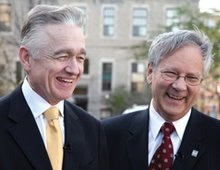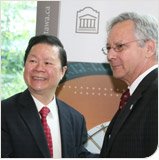 The November 26, 2007, closing arguments in the labour law arbitration case of activist professor Denis Rancourt vs. the University of Ottawa greatly clarified the university position.
The November 26, 2007, closing arguments in the labour law arbitration case of activist professor Denis Rancourt vs. the University of Ottawa greatly clarified the university position.Legal Council for the university, Michelle Flaherty, backed by university HR officer Louise Pagé-Valin and ex-dean of science Christian Detellier, pleaded for the university discipline against Rancourt to be upheld. The arbitrator’s decision is expected within a month or more.
Flaherty explained that [despite the letter of reprimand’s profuse insinuations regarding Rancourt’s alleged subversion of course content] the discipline was limited only to Rancourt having allegedly advertised the course (PHY 1703, Fall 2005; required course in Environmental Studies, ES) on the web in a manner not consistent with the official Senate-approved course description.
Of particular concern to the university, were Rancourt’s uses of the words “new,” “bilingual,” and the use of an informal alternative title stressing activism.

This appears to be the first time that a university professor is disciplined for the manner in which she has advertised or promoted one of her courses, as Flaherty stated having found no relevant case law.
Flaherty argued that the discipline should be upheld because students needed to be protected from false advertisement; as this was unfair, irresponsible, confusing for students, and could have serious implications in students’ lives. Flaherty cited the university’s mandatory duty to protect students no less than six times in her approximately 90-minute presentation.
The executive members of the ES Student Association who unanimously endorsed the course were not consulted or allowed to testify, nor were any of the 87 registered students, or any of the more than 600 students who signed petitions to create more courses like the one given by Rancourt in 2005; nor were any of the related documents allowed to be submitted into evidence, by Rancourt’s union that wanted only “relevant” items.
Flaherty read out what the university considers the most damning elements of Rancourt’s “advertisement” as follows:

“The idea is that students will be able to follow their own interests and largely determine class content and direction, via a participatory democracy town hall-type process.”
“The course will largely be administered by a process called "participatory democracy" (PD). This means that the students themselves can (democratically and by consensus) decide on much of the course content, methods, invited speakers, class activities, readings, etc. All such decisions can be revisited periodically and the course curriculum and administration can be adjusted as we go. This means that the course can be greatly tailored to the needs and interests of the students.”
and explained that, therefore, dean Detellier had no way to guarantee that the students would learn science. (*)
Flaherty’s facial expression said it all: “You see. It was going all to hell…!”
There you have it.
That’s what it’s all about: Control, this notion that you can force students to learn. And that the university has a duty to force students to “learn what’s good for them.” And if we have to discipline our professors to understand this, then we will!
Who needs pedagogical research? We have PhDs.
[Photo credits: Ottawa IndyMedia]
(*) This allegedly stressed the dean to the point of performing an in-class tantrum at the second class of term, for which the university has since apologized in writing, just days before the start of the arbitration.
RELATED LINKS
Israel Lobby elephant in the room
Did the dean lie?
52 profs complain about Rancourt
Academic squatting
Rancourt barred from all courses




2 comments:
The University might as well proudly hang a "Vision 1020" banner on the Desmarais Death Star.
"The Function of the Schools
Woman: But I guess I don't quite see how this ideological control mechanism actually works in the humanities and social sciences - I mean, how exactly is it that the schools end up being an indoctrination system? Can you describe the process in more detail?
[Chomsky:] Well, the main point I think is that the entire school curriculum, from kindergarten through grade school, will be tolerated only so long as it continues to perform its institutional role. So take the universities, which in many respects are not very different from the media in the way they function - though they're a much more complex system, so they're harder to study systematically. Universities do not generate nearly enough funds to support themselves from tuition money alone: they're parasitic institutions that need to be supported from the outside, and that means they're dependent on wealthy alumni, on corporations, and on the government, which are groups with the same basic interests. Well, as long as the universities serve those interests, they'll be funded. If they ever stop serving those interests, they'll start to get in trouble."
Noam Chomsky, page 233 of chapter 7 (Intellectuals and Social Change) in "Understanding Power".
Post a Comment